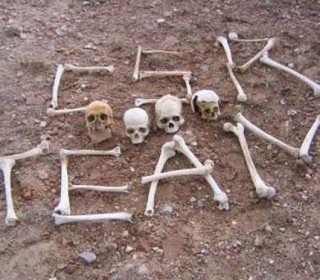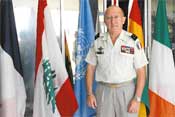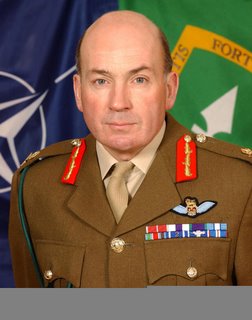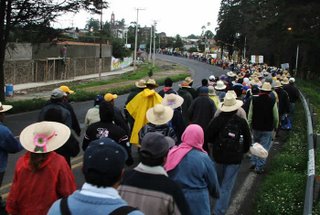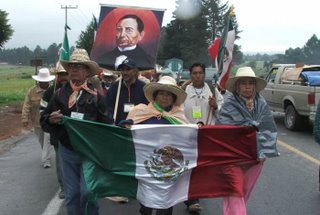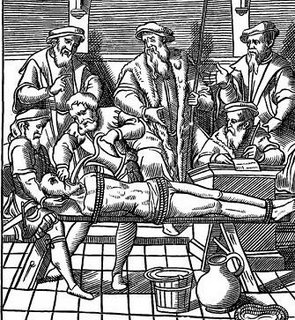Pierre-Jean Luizard, a French expert on Iraq, discusses the impasse. [From a chat in Le Monde, avaiable in the paper's archives [subscription required].
Don't want to read it all? Shorter Luizard. Anybody who thinks that the Iraqi central goverment can do anything about the violence is kidding themselves. The militias hold the power. The US is training "secular" troops outside Iraq but a coup d'etat would fail. The Kurds are being strangled by a Turkish blockade. The Coalition cannot withdraw because of regional consequences.
Q. Do you think than an immediate withdrawal of US troops from Iraq will contribute to the restoration of security in that country?Even if the US occupation seems today to be the main factor in the division of Iraqi society along ethic and religious lines, the damage has been done and an announcement of the withdrawal of Coalition forces would mean an admission of defeat by Washington in the eyes of all the leading figures with the complete set of regional consequences that would entail.
Today, Iraq faces a series of impossibilities: the impossibility of finding national unity amidst foreign occupation and therefore the transfer of real power to an Iraqi government sufficiently stable to set a schedule for withdrawal of US troops; and the impossibility on the part of US leaders, whether Republican or Democrat, to recognize the defeat of their strategy in Iraq.
A retreat is not on in the cards, but one could imagine that if it were announced, it would be immediately interpreted by the enemies of the United States in Iraq, in particular the Sunni insurgents, as a victory which, in fact, it would be.
A retreat is not on in the cards, but one could imagine that if it were announced, it would be immediately interpreted by the enemies of the United States in Iraq, in particular the Sunni insurgents, as a victory which, in fact, it would be.
With or without a US retreat, inter-communitarian clashes are nowhere ready to end in Iraq.
Q. By acquiring nuclear energy, Iran wishes to assert its influence in the region, thereby avoiding destabilization and even overthrow of the regime by outsiders. I don’t believe that Iran desires chaos in Iraq. Can we imagine Iran playing a stabilizing role in Iraq which would in turn imply a radical shift in US policy in the region? Contrary to official pronouncements, the United States can only congratulate itself for Iranian policies in Iraq. It is owing to the benediction of Tehran that Washington was able to establish an unspoken partnership with the Shi’ite majority in Iraq, without which the country would have been long ago transformed into a hell for Coalition troops.
Iran gave its support to the political reconstruction of Iraq along communitarian lines as promoted by the United States and called upon Iraqi Shi’ites to participate in the ongoing process, i.e., in the different elections and federal projects, so far rejected by the Sunnis.
Iran seems to have marhsalled the extent of its influence in Iraq in promoting participation in the ongoing political process. The position of Tehran is far less influent in Iraq than claimed by the US, which is seeking scapegoats to justify its failure.
Iran is now by and large a spectator of the hellish violence in Iraq, and the implosion of Shi’ite society, the prime vector of Iranian influence in Iraq, demonstrates the point to which Iraq’s neighbors, first of whom is Iran, are powerless before a situation that no one seems able to control.
The Iranians have no interest in seeing the Shi'ite members of government fail, which would also mean failure for Tehran. It seems that the desperate measures on the part of the American to find an exit from the Iraq crisis will necessarily have to include Iran.
The Americans are conscious of the fact that there can be no stabilization in Iraq without Iranian cooperation, which is shown by the fact that the US and Iran together infiltrated Iraqi political parties and the militias which may or may not linked to them.
Among the exit scenarios under study in Washington is putting an end to the Iraqi parliamentary experience and the eviction of a corrupt political class that has lost all credibility in the eyes of the Iraqis for their inability to agree and to end the insecurity.
In this perspective, a strongman, possibly a military man recruited from among non-confessional groups relying upon separation of powers among the three communities through a national pact, like that which institutionalized confessional politics in Lebanon, could find favor in Tehran.
However, such a scenario would imply an armed force more powerful than the militias, which today control the real power on the ground, is unimaginable.
If such a plan, like all the others, were to fail, Iran would be compelled, as well as the United States, to witness the eruption of the Iraqi volcano, with the consequence of watching the eruptions spill over the Iraqi crater.
Q. Does there exist today progressive and independent movements in Iraq? What do you think of the Communist Workers Party of Iraq and the Freedom Assembly of Iraq?As it the case throughout the Arab and Muslim world, the parties that were considered progressive in the 50’s and 60’s have given way to religious forces. Everywhere, the secular movements (nationalist and Marxist parties) that were active on the scene back then have been replaced by Islam.
The destiny of the Iraq Communist Party (one of its factions participates in the current government under US military occupation) serves as a good illustration. The communist party that was once the most powerful in the Arab world (the Iraqi Communist Party) is reduced today to Westernized secular elites obsessed with the “Islamist” danger and ready to rally to the American agenda for Iraq. Numerous Marxist Arab intellectuals, especially Iraqis, began to do precisely this beginning in the 1970s.
In the face-off between the Americans and Islamist movements, whether Sunni or Shi’ite, there is no longer room for progressive and/or secular movements; the ideals of these parties have been widely discredited by the authoritarian regimes which elevated them, among which the regime of Saddam Hussein figures prominently.
Q. It is strange to note that regionalization, generally invoked as necessary in managing conflicts (Ex-Yugoslavia, Africa), has not been proposed for Iraq. Could we foresee Arab troops (those armed and supported by the Americans) replace Anglo-American occupation troops? Would such troops we welcomed by the different rebel groups? Would they be neutral in the emerging civil war between the Shi’a and Sunnis?The option of Arabization of the conflict in Iraq is rejected by the immense majority of Iraqis themselves, who have not forgotten, especially the Kurds and the Shi’a, the complicity, not to mention the cooperation, of the Arab world (the majority of which is Sunni) with the regime of Saddam Hussein.
Today in Iraq, Arab countries are considered complicit in the conflict ripping apart the country and even the Sunnis would not welcome the presence of Arab troops, say, from Egypt, where government is conducting a war against the Islamists, in support of a manifest American agenda in Iraq.
Q. What about the oil companies? Was the US successful in realizing its objectives? Is oil a catalyst in the conflict?Contrary to what may were saying when the invasion was launched to remove Saddam Hussein, this war was not inspired by oil.
Before 2003, with a defeated Iraq still under the control of Saddam Hussein, who saw most the of the country’s sovereignty dismantled by UN resolutions proposed by the victors, control of the second largest oilfields in the world (those in Iraq) fell into the hands of the United States without invasion or occupation of the country.
During the 1990s, the United States controlled Iraqi oil and thus, given its importance, controlled crude oil market prices in the name of the international community through the instrumentalization of UN resolutions which, with a stroke of the pen, cancelled out the 1970s nationalization of Iraqi oil.
In the current chaos, oil production is far below prewar levels and the cost of insurance renders the cost of oil production prohibitive. But oil does play an essential role as a fuel in internal rivalries, especially in Northern Iraq, where the oilfields are mostly situed in areas of mixed populations: Arabs, Turks, Turkmen, Shi’a and Sunnis.
Oil is one of the key resources for the militias and for certain political parties, which explains the efforts within the government of these parties to promote federalism, a disguised partition of the country.
Q. Are we going to see the establishment of a theocracy? I heard a politician say that if the West wants democracy in Muslim countries, then it must wait for the arrival of Islamic governments.The specter of a theocracy is often waved about for Iraq but for such a “danger” to materialize, the Islamists would have to infiltrate an institution. But such institutions are totally absent and the central government really only controls the Green Zone. Power on the ground is in the hands of local groups, a paradoxical alliance of political parties, tribes and mafiosi.
The absence of a government in Iraq favors the emergency of such powers which locally act as vertible parallel government institutions, subjecting the regions they control to Islamic power such as they conceive it.
This has been the case since 2003 in the immense Sadr City quarter of Baghdad, as well as in the quasi Jihadist emirates that exist in the center of the capital, just a few steps from the Green Zone.
Q. Installed in the mountains of Northern Iraq, what is the role of the PKK in the three-way relations of Iraq/Turkey/USA. Will Turkey intervene?The fate of Iraqi Kurdistan appears to be separate from that of Sunni Iraq in the minds of all the protagonists, American as well as Iraqi, including neighboring countries.
Kurdish leaders have evidently decided to drive their region toward independence and they will refuse to reenter Iraqi politics should a central government be built, however minimal it may be in controlling regional affairs.
The Kurdish question is a big question mark because regional considerations as well as local realities preventing the emergence of an independent Kurdish state.
Kurdish leaders have maneuvered their province into a more or less long-term impasse, which appears to be less reversible every day. Recent events in Turkey and Iraqi Kurdistan, where Turkey has imposed a trade embargo, reveal that Kurdistan has little future, beyond fait accompli, regardless of how powerful the Kurds are.
The presence in Iraqi Kurdistan of opponents of Turkey and Iran, especially the hundreds of PKK fighters from Turkey, is an issue that remains a tool for Kurdish leaders to put pressure on the two countries concerned relating to the Kurdish question.
But the presence of a PKK army, as well as the People’s Mujahedeen in southern Kurdistan, will remain on the back burner given the growing uncertainty surrounding the future of Iraq’s Kurdish provinces.
Q. Exiting the crisis implies reconstruction of Iraq. But doesn’t the US control of reconstruction jeopardize the future of peace in Iraq?Iraq is a rich country (oil and natural gas, water, a balanced and educated population) but the spiral that is pushing Iraq back decades is a political. Iraq's wealth is paradoxically fueling the destruction and communitarian hatred instead of constituting a factor for unification.
There will be no reconstruction of the Iraq economy without restoration of a modicum of security and as long as the official status of Iraq’s principal resources remains without consensus between the different Iraqi communities.
Q. What was the NeoCon strategy for Iraq after Saddam Hussein and why did it fail?When the US went to war against Saddam Hussein in 2003, it did not bargain on taking responsibility for the reconstruction of Iraq. Great was their surprise when, after the fall of the regime, all of Iraq’s institutions collapsed: army, ministries, etc.
This paradox is linked to the irrational decision by the United States to invade a country which was guilty of none of the things of which the Bush Administration accused it and which had been a strategic ally of the United States in the 1980s.
This is confirmation of short-sighted policy and the blind stumbling in the weeks following the occupation. Washington initially believed that it could easily recycle what remained of the state apparatus under Saddam Hussein to perpetuate the same system, which was meant to be Saddam Hussein without Saddam Hussein. It expected Sunni Arabs to continue to dominate the other two communities (the Shi'a and the Kurds).
It was only in July 2003, after it realized it had no sufficiently representative partners within the Sunni establishment and, facing the threat of the Shi’a leadership to open a front against the occupation, that the US decided, with the tacit agreement of Iran, to partner with Shi’ite leaders, the Kurds being in no case able to suffice, as was the case the with Northern Alliance in Afghanistan, to build a new power base in Baghdad.
The political reconstruction of Iraq along communitarian lines was not intended by the United States; it was imposed by forces on the ground.
The tragic circumstances in which the Iraqi population lives today is aggravated by the recent realization that the situation in Iraq is largely out of anyone’s control. Day after day, the Iraqis see that no force outside the crisis in which they live can save them.
The chance for a UN solution was missed long ago, and the reliance on the smallest possible denominator among the Iraqi population, with the general implosion of allegiances, displays the profound despair of the population, which has lost all confidence in the political class to deliver a providential savior.
Beset by the increasingly murderous chaos, many Iraqi have come to hope in the arrival of a strongman in Baghdad, even if such a possibility is completely out of reach.
Q. What options are left to Washington today?In the approach of the US mid-term elections, the Iraqi issue has become essential because President Bush is unable to claim that things are improving in the Iraq. Moreover, rumors concerning a shift in policy are fed by those close to the President.
Among the rumors, the possibility of a military coup d’état has been repeatedly suggested (possibly as a means to put pressure the Iraqi political class). We know today that the Americans are building an Iraqi military force outside Iraq recruited on a non-communitarian basis and that the US is probing Tehran to discover if Iran would agree to partner with it again as the Islamic Republic did in building the current parliamentary regime in July 2003.
Fantasy or reality, such a possibility is completely unrealistic if one realizes that power really resides in the hands of the militias, which currently provide most of the backing to Iraq’s political parties. The outbreak of rumors on a possible exit scenario ahead of the of the upcoming mid-term elections illustrates the impossibility of the US Administration to claim any victory whatsoever in Iraq.
Labels: Iraq, Islam, War on Terror



